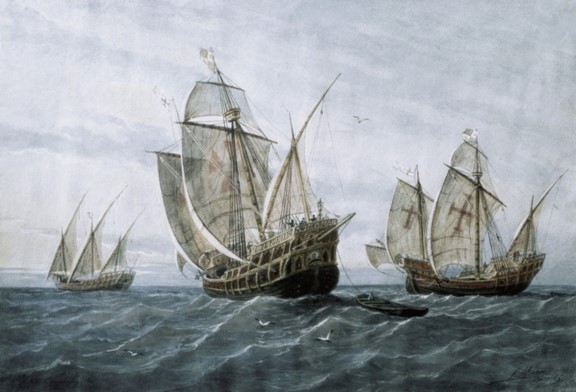Canceling Christopher Columbus
One of the cancel culture's most vicious attacks on American history involves the Italian explorer Christopher Columbus, who for more than half a millennium was revered for his discovery of the "New World." While Columbus Day has remained a federal holiday since 1937 — celebrated this year on October 11 — many cities across the country have expunged it from their calendars and instead proclaimed "Indigenous Peoples Day."
Statues and monuments honoring Columbus have been vandalized or torn down in many locations throughout the land. In New York City's Central Park, the 76-foot tall statue of the explorer in Columbus Circle must be under constant police guard due to activists who want it torn down.
Jarrett Stepman of The Daily Signal described the basis for these threats in 2017: Activist historians in the late 20th century began concocting "a new narrative of Columbus as a rapacious pillager and a genocidal maniac." He was portrayed as a rapist and relentless treasure seeker.
Howard Zinn, one of the most influential and destructive of those historians, was immensely successful at tarnishing the legacy of Columbus in the minds of an entire generation. Stepman wrote: "Zinn not only maligned Columbus, but attacked the larger migration from the Old World to the new that he ushered in. It wasn't just Columbus who was a monster, according to Zinn, it was the driving ethos of the civilization that ultimately developed in the wake of his discovery: The United States."
Sullying the legacy of Columbus is part of a broader scheme to do away with America's storied past and replace it with a socialist fantasy of darkness and evil. At the core of Zinn's wrath against Columbus, for example, is hatred of the American system of free enterprise. Zinn tellingly wrote: "Behind the English invasion of North America, behind their massacre of Indians, their deception, their brutality, was that special powerful drive born in civilizations based on private profit."
In reality, Columbus' voyages were about spreading Christianity and for discovering a new route to the far east, specifically China. Historian Carol Delaney, professor emerita at Stanford University, says most people criticizing Columbus today "know very little about the man and are blaming him for things he did not do."
Delaney's research shows that Columbus' true motive for seeking profits from trade with China was to "finance a crusade to wrest Jerusalem back from the Muslims before the end of the world." For whatever reasons, Columbus believed the world had very little time left.
For whatever reasons, Columbus believed the world had very little time left.
Both Stepman and Delaney describe the immense dangers Columbus and his men faced as they crossed the Atlantic in search of what Columbus thought was a route to Asia. The hardship and dangers were immense. After the Santa Maria went aground its first voyage, Columbus had to return to Spain to obtain a rescue ship, leaving 39 men behind. Delaney wrote that Columbus had befriended the indigenous natives, especially the chief, Guacanagari and that he "left strict orders that they respect and obey Guacanagari, that they not go marauding and raping.
"[Queen] Isabella sent him back with 17 ships and hundreds more men. A gruesome sight awaited them — all 39 men were dead and spread out on the beach. The incoming sailors wanted revenge on Guacanagari but Columbus said no. He learned that the men had gone against his orders, went marauding to another group of natives and that group came and killed them. He remained friends with the chief but had a difficult time with the incoming men."
Stepman wrote: "The world was a much bigger place than most had imagined, and although Columbus never personally realized the scope of his discovery, he opened up a new world that would one day become a forefront of human civilization.
"This is the man and the history that earlier generations of Americans came to respect and admire."
Stepman further noted that previous attempts to diminish Columbus occurred in the 19th century by "anti-Catholic and anti-Italian groups like the Ku Klux Klan." He adds that, in our own time, "it would be a tragic loss for our generation and those of the future if the actions of far-left groups prevail who want to see his legacy buried forever."
Professor Delaney described a little-known fact about the motives of Columbus, that he not only believed Jerusalem had to be in Christian hands so Christ could come again to save all believers, but that when he encountered the natives, he wanted them to be saved as well, and he kept asking Isabella to send more priests to teach and baptize them.
According to Delaney's years of research, when Columbus returned to Spain for the last time, "he became a lay Franciscan monk and is said to have worn the robes for the rest of his life. Columbus the monk! Whoever heard of this?" she asks.
It appears that the truth about Christopher Columbus is that he was, after all, what many Americans have long believed: a hero for the ages.
Daily Signal Podcasts; Providence Journal.com/2020/10/07; TheCity.nyc/2021
Want to be notified of new
Education Reporter content?
Your information will NOT be sold or shared and will ONLY be used to notify you of new content.
Click Here
Return to Home Page
